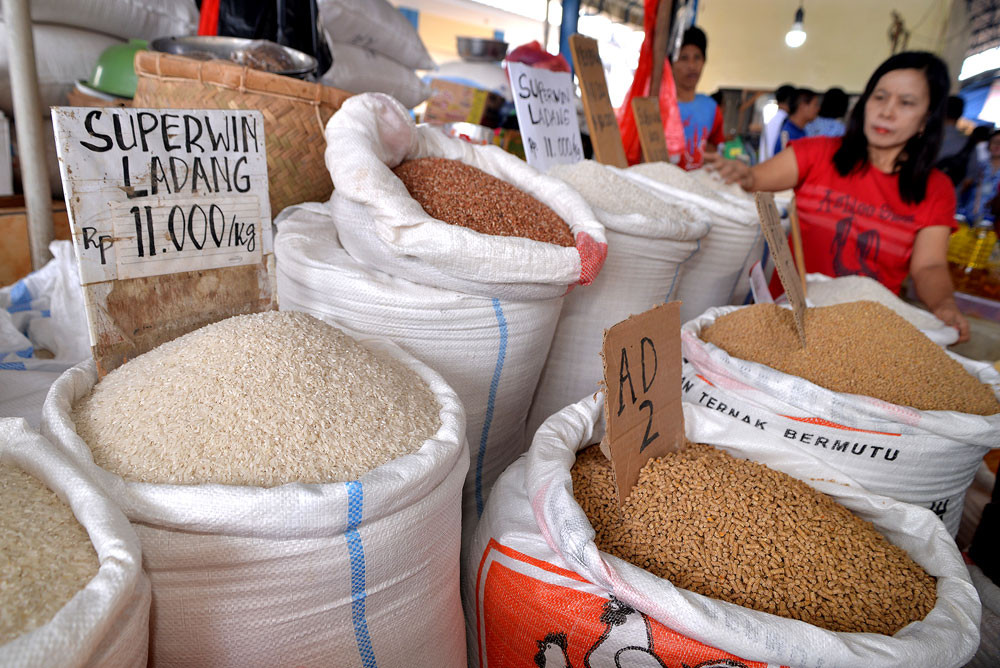Popular Reads
Top Results
Can't find what you're looking for?
View all search resultsPopular Reads
Top Results
Can't find what you're looking for?
View all search resultsReflections on agriculture and its role
Even without COVID-19, everyone would agree that managing agriculture is complex. What could the agriculture sector learn from the outbreak so far?
Change text size
Gift Premium Articles
to Anyone
W
ith COVID-19 still raging worldwide, much attention in terms of resource allocation, policymaking and support has been provided to the health sector, and rightly so.
As restrictions on mobility have been widely applied, there is growing concern about how countries will continue to supply essential goods, from healthrelated items, such as face masks, medicines and hand sanitizer, to food. This warrants a reflection on how agriculture has been and could be affected by the COVID-19 pandemic.
Even without COVID-19, everyone would agree that managing agriculture is complex. The sector faces typical business risks and market uncertainty, and given its unique nature, also faces the challenges of natural disasters and resource constraints, particularly land and water, and must respond to continued pressures from consumers to ensure food safety, traceability and the sustainability of agricultural practices.
What could the agriculture sector learn from the outbreak so far?
First, an immediate and observable change that occurred at the beginning of the COVID-19 outbreak was that consumers’ shopping behavior changed. In Australia, for example, “panic buying” is a concern, and Australian Prime Minister Scott Morrison has called those who hoard supplies “un-Australian”. Despite assurances that the country has enough supplies, empty supermarket shelves, including for foods with a long shelf life, are still found across the country.
Meanwhile, there is little evidence of the same issue occurring in Indonesia. The Agriculture Ministry, through its social media platform, reports on the minister’s inspections of agri-food product distribution and provides confirmation that the country is not experiencing a supply shortage. However, with more people staying home because of school and office closures, people’s uncertainty about their ability to access supermarkets and growing concerns about the virus itself, a spike in demand could become an issue in the near future.
Second, changes to consumer behavior have put the ability of the entire food supply chain to respond to sudden increases in demand to the test. In addition to pressures on the supply chain to continue monitoring food safety and workers’ health, the production segment of the chain, including farmers and processors, are working around the clock to not only continue production, but also to look for ways to increase their output.
This is amid the significant risks of economic recession, which could slow down demand for food. It is, therefore, necessary to carefully consider what the appropriate levels of production and distribution for specific products are, so as to avoid excess supply in the future. For some, increasing production is not feasible. Input suppliers and agricultural services can longer operate as usual. Some agribusinesses might need to send workers home, causing production to drop. Combined with existing production issues, this could adversely impact business operations, as well as the mental health of business owners, which is another concern we have not discussed much.
Similarly, the retail sector should be proactive in ensuring that all consumers have access to supplies. In Australia, for example, measures implemented to help ensure “fair” distribution of supplies and minimize the risk of COVID-19 transmission include designated shopping hours for the elderly, individual purchase limits, physical distancing requirements in checkout lines and frequent cleaning. For Indonesia, one of the challenges is to ensure appropriate measures are adopted at traditional markets, such as physical distancing and hygiene requirements and the monitoring of the health of traders.
Third, we have learned that the adoption of a whole-of-chain approach is important to ensure that agriculture can contribute to efforts to fight COVID-19. In the event of a shutdown or lockdown, for example, it is not always clear whether all segments of the food supply chain are listed as “essential services”. While supermarkets and freight and logistics services were listed as essential services in Australia from the outset, the National Farmers Federation has called for all other segments of the food supply chain, such as input suppliers, farms, abattoirs and processing factories, to also be listed so they can continue to operate.
Fourth, the agriculture sector should continue to take advantage of new digital technologies, which have become part of the new normal in the ways people operate and connect. Sales of agrifood products on e-commerce platforms in Indonesia have reportedly increased markedly.
Our current hardship should also stimulate the further dissemination of technology among smallholder farmers and services providers, including public and private extension officers. E-commerce platforms in Indonesia can play a significant role in this. There seems to be no reason as to why the “digitalized food chain” cannot improve farmers access to the support they need, including technical advice, financial services and production inputs, even during the shutdown period.
E-commerce platforms should take advantage of their increased sales by not only distributing products but also important information related to COVID-19, such as government announcements, recommendations on healthy products and the like, to their consumers. Ideally, profits made from these increased sales should be channeled back to farmers and/or communities to help them to cope in this challenging time.
Fifth, beyond the short-term effects of and responses to the COVID-19 outbreak, there are some longer-term considerations. From this outbreak, we have learned there is a continued need to ensure our food security by managing risks appropriately, ensuring sufficient national supply, storage and distribution and monitoring our reliance on imports and our level of domestic food production. Despite the novelty of COVID-19, none of these issues are new. Perhaps one element that is distinct about the outbreak is that since it is a global pandemic, global efforts are likely to be necessary.
***
Senior lecturer in the School of Economics, Deakin University, Australia











